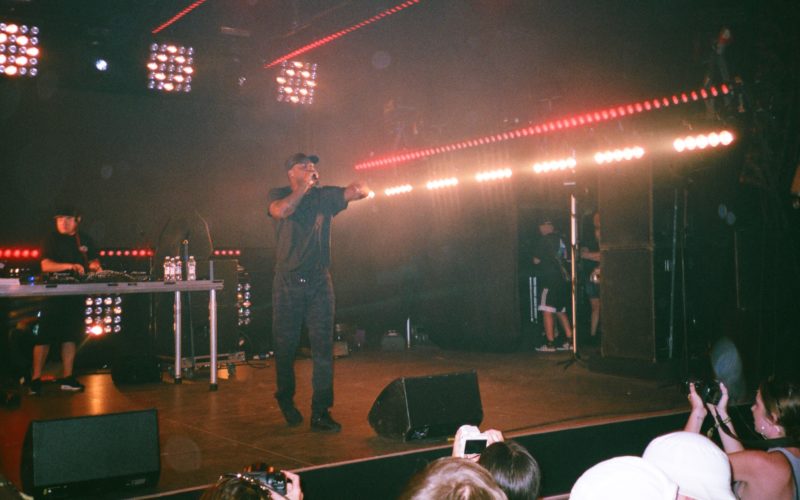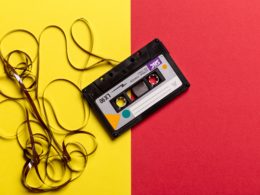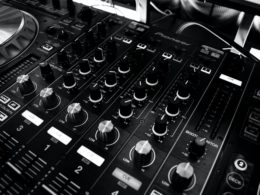In 1993, Snoop Dogg was tried for first-degree murder because his bodyguard had allegedly killed a rival Blood gang member while riding in Snoop Dogg’s car.1[1]Mahlik Campbell, 10 Rappers Whose Lyrics Were Used In Court, From YNW to Melly to Snoop Dogg, Daquan, (Jan, 12, 2022), https://daquan.tv/music/10-rappers-whose-lyrics-were-used-in-court-from-ynw-melly-to-snoop-dogg. At trial, Snoop Dogg’s song, Murder Was the Case, which released earlier that year, was played before the jury.2[2]Id. The songs introductory skit suggests that Snoop Dogg was involved in a murder as another man (presumably his body guard) asked Snoop Dogg for a gun and more ammunition “Cause I’m about to smoke this fool.”3[3]Id. The prosecutor hoped to use Snoop Dogg’s lyrics to convict him of first-degree murder.4[4]Id. While Snoop Dogg and his bodyguard were acquitted, this is just one example of rappers’ lyrics being used as evidence in criminal proceedings.5[5]Id.
Other artists whose lyrics have been used against them in court include Tay-K, Meek Mill, and Bobby Shmurda regarding fatal robbery, probationary violations, and weapons and conspiracy charges respectively.6[6]Id. In each case, the prosecutor attempted to use the artist’s lyrics to prove they are guilty. Most recently, prosecutors have attempted to use Young Thug and Gunna’s lyrics as evidence regarding their pending Racketeer Influenced and Corrupt Organizations Act (RICO) charges.7[7]Id. The RICO charges stem from the rappers’ association with Atlanta based street gang, Young Slime Life Atlanta.8[8]Ashley King, Rolling Stone Prepping Documentary About Young Thug & YSL Records, Digital Music News, (July 11, 2022), https://www.digitalmusicnews.com/2022/07/11/rolling-stone-young-thug-documentary/.
Protecting artistic expression, particularly in rap music, is important given the 500+ instances of rap lyrics being used as evidence in criminal cases.9[9]Rodney Carmichael, The Racist Roots of Rap on Trial, (March 16, 2021), https://www.npr.org/2021/03/16/975359725/the-racist-roots-of-rap-on-trial. This is a trend unique to rap music. Artists of other genres such as Johnny Cash, who claimed to “shot a man in Reno, just to watch him die” in his song Folsom Prison Blues, have not had their lyrics used against them in criminal proceedings.10[10]Folsom Prison Blues, https://genius.com/Johnny-cash-folsom-prison-blues-lyrics. To address rap artists’ lyrics being disproportionately used as evidence, Congressmen Hank Johnson (D-GA) and Jamaal Bowman (D-NY) introduced the Restoring Artistic Protect Act (“RAP Act”) in the U.S. House of Representatives in July 2022.11[11]Restoring Artistic Protection Act, H.R. 8531, 117 Cong. If passed, the bill would restrict the admissibility of artists’ lyrics as evidence in criminal proceedings at the federal level.12[12]Id.
The proposed act would amend the Federal Rules of Evidence Article IV by raising standards for admissibility in criminal proceedings.13[13]Id. The Federal Rules of Evidence Article IV, Relevance and It’s Limits, governs the admissibility of evidence based on relevancy.14[14]Fed. R. Evid. 401. Under Article IV Rule 401, “Evidence is relevant if: (a) it has any tendency to make a fact more or less probable than it would be without the evidence; and (b) the fact is of consequence in determining the action.”15[15]Id.
The proposed act, Rule 416. Limitation on admissibility of defendant’s creative or artistic expression, would amend current evidence rules, providing that “evidence of a defendant’s creative or artistic expression, whether original or derivative, is not admissible against such defendant in a criminal case.”16[16]Restoring Artistic Protection Act, H.R. 8531, 117 Cong. at § 2(a)(a). This would significantly restrict the possibility of artists’ “forms, sounds, words, movements or symbols, including music, dance, performance, art, visual art, poetry, literature, film and other special objects or media” from being used against them in criminal proceedings.17[17]Id. at § 2(a)(e). Under this newly proposed evidence rule, a court may only admit a defendant’s artistic work into evidence if the prosecution proves that the defendant intended for the expression to be interpreted literally, or if the expression is derivative of others’ works, that they intended for it to be interpreted as their own thought(s).18[18]Id. at § 2(a)(b)-(4). Facts that are specifically relevant to a crime’s disputed issue may be admitted into evidence only if they cannot be obtained elsewhere.19[19]Id. at § 2(a)(b)-(4).
If codified, the RAP Act would impact future artists’ cases, including Young Thug and Gunna’s RICO case. Young Thug is accused of co-founding the Young Slime Life Atlanta gang, which has allegedly committed carjackings, shootings, and murder in Atlanta.20[20]Id. Because many of Young Thug and Gunna’s songs incorporate lyrics suggesting similar crimes, the prosecution wants to enter several of their songs’ lyrics into evidence.21[21]Id. The RAP Act’s proposed amendments to the admissibility of evidence rules and the standard for relevancy would help protect artists’ First Amendment rights to freedom of speech and creative expression.
Similar legislative efforts to protect artists creative rights have occurred at state levels in California and New York. In September of 2022, California Gov. Newsom signed the Decriminalizing Artistic Expression Act into law.22[22]August Brown, Gov. Newsom signs bill restricting use of rap lyrics in criminal trials, (Sept. 20, 2022), https://www.latimes.com/entertainment-arts/music/story/2022-09-30/rap-lyrics-bill-governor-newsom-decriminalizing-artistic-expression-act. The Decriminalizing Artistic Expression Act, like the RAP Act, aims to limit the use of artist’s creative expressions against them as evidence in criminal proceedings.23[23]Id. The act creates a higher threshold in which California prosecutors must show that the expression is factually specific to the crime and contains details otherwise unknown to the public.24[24]Id. Additionally, New York State Senator, Brad Hoylman (D), has sponsored Senate Bill S7527, known as “Rap Music on Trial.”25[25]Senate Bill S7527, https://www.nysenate.gov/legislation/bills/2021/S7527. If codified, the bill would establish “an assumption of inadmissibility of evidence of a defendant’s creative or artistic expression against such defendant in a criminal proceeding; requires the proffering party to affirmative prove that the evidence is admissible by clear and convincing evidence.”26[26]Id. As of 10/17/2022, the bill has passed the Senate and is awaiting Assembly approval.27[27]Id. It is currently cosponsored by fellow New York senators Jamaal T. Bailey (D), Alessandra Biaggi (D), Zellnor Myrie (D), Elijah Reichlin-Melnick (D), and Julia Salazar (D).28[28]Id. Such parallels in legislative efforts at the state level illustrate Democratic party efforts to advocate for the protection of artist’s free speech.
The RAP Act has received support both on Capitol Hill and in the music community.29[29]Congress Johnson, Bowman introduce Bill To Protect Artists’ 1st Amendment Rights, Hank Johnson, (July 27, 2022), https://hankjohnson.house.gov/media-center/press-releases/congressmen-johnson-bowman-introduce-bill-protect-artists-1st-amendment. In addition to Congressmen Johnson and Bowman, five other Democrat Congressmen have cosponsored the bill as of October 12, 2022.30[30]H.R. 8531- Restoring Artist Protection Act of 2022, https://www.congress.gov/bill/117th-congress/house-bill/8531/cosponsors. This list includes Carolyn Maloney (D-NY), Pramila Jayapal (D-WA), Bennie Thompson (D-MS), Cori Bush (D-MO), Nikema Williams (D-GA), and Shelia Jackson Lee (D-TX).31[31]Id. The bill has also been strongly promoted by the music community, including senior officials from the Song Writers of North America, Universal Music Group, and Atlantic Records.32[32]Congressmen Johnson, Bowman introduce Bill To Protect Artists’ 1st Amendment Rights, Hank Johnson, (July 27, 2022), https://hankjohnson.house.gov/media-center/press-releases/congressmen-johnson-bowman-introduce-bill-protect-artists-1st-amendment. Additionally, at the Black Music Action Coalition Gala, 300 Elektra Entertainment Chairman and CEO, Kevin Liles, spoke about the bill’s importance in his BMAC Social Impact Award acceptance speech.33[33]Breanna Bell, Lil Baby, Tylker the Creator, G-Eazy Turn out for Black Music Action Coalition Gala as Jon Platt, Kevin Lilies Deliver Poignant Speeches, (Sept. 23, 2022), https://variety.com/2022/music/news/lil-baby-tyler-the-creator-g-eazy-black-music-action-coalition-gala-1235382267/. Liles highlighted the underlying racism associated with current federal evidence rules and called for reform.34[34]Id. He said, “Scholars around the world have tracked almost 500 cases of Black and brown people subjected to a double standard and treating that art as confessions in court. This doesn’t happen if you’re white. Not ever.”35[35]Id.
Passing the RAP Act would help protect artists’ work from being used against them in criminal proceedings and from racial discrimination trends occurring under current federal evidence rules. Artistic freedom of expression is crucial to the music industry and such creativity should not be stifled by fear of repercussion. While some creative expression is controversial, the RAP Act’s restrictions on evidence admissibility should be implemented to protect artists’ creative process.
1 Mahlik Campbell, 10 Rappers Whose Lyrics Were Used In Court, From YNW to Melly to Snoop Dogg, Daquan, (Jan, 12, 2022), https://daquan.tv/music/10-rappers-whose-lyrics-were-used-in-court-from-ynw-melly-to-snoop-dogg.
2 Id.
3 Id.
4 Id.
5 Id.
6 Id.
7 Id.
8 Ashley King, Rolling Stone Prepping Documentary About Young Thug & YSL Records, Digital Music News, (July 11, 2022), https://www.digitalmusicnews.com/2022/07/11/rolling-stone-young-thug-documentary/
9 Rodney Carmichael, The Racist Roots of Rap on Trial, (March 16, 2021), https://www.npr.org/2021/03/16/975359725/the-racist-roots-of-rap-on-trial
10 Folsom Prison Blues, https://genius.com/Johnny-cash-folsom-prison-blues-lyrics
11 Id.
12 Id.
13 Id.
14 Fed. R. Evid. 401.
15 Id.
16 Restoring Artistic Protection Act, H.R. 8531, 117 Cong. at § 2(a)(a).
17 Id. at § 2(a)(e).
18 Id. at § 2(a)(b)-(4).
19Id. at § 2(a)(b)-(4).
20 Id.
21 Id.
22 August Brown, Gov. Newsom signs bill restricting use of rap lyrics in criminal trials, (Sept. 20, 2022), https://www.latimes.com/entertainment-arts/music/story/2022-09-30/rap-lyrics-bill-governor-newsom-decriminalizing-artistic-expression-act
23Id.
24 Id.
25 Senate Bill S7527, https://www.nysenate.gov/legislation/bills/2021/S7527
26 Id.
27 Id.
28 Id.
29 Congressmen Johnson, Bowman introduce Bill To Protect Artists’ 1st Amendment Rights, Hank Johnson, (July 27, 2022), https://hankjohnson.house.gov/media-center/press-releases/congressmen-johnson-bowman-introduce-bill-protect-artists-1st-amendment
30 H.R. 8531- Restoring Artist Protection Act of 2022, https://www.congress.gov/bill/117th-congress/house-bill/8531/cosponsors
31 Id.
32 Congressmen Johnson, Bowman introduce Bill To Protect Artists’ 1st Amendment Rights, Hank Johnson, (July 27, 2022), https://hankjohnson.house.gov/media-center/press-releases/congressmen-johnson-bowman-introduce-bill-protect-artists-1st-amendment
33 Breanna Bell, Lil Baby, Tylker the Creator, G-Eazy Turn out for Black Music Action Coalition Gala as Jon Platt, Kevin Lilies Deliver Poignant Speeches, (Sept. 23, 2022), https://variety.com/2022/music/news/lil-baby-tyler-the-creator-g-eazy-black-music-action-coalition-gala-1235382267/
34 Id.
35 Id.
Written by: Douglas Waltzer
Douglas is a 2024 J.D. Candidate at Brooklyn Law School




